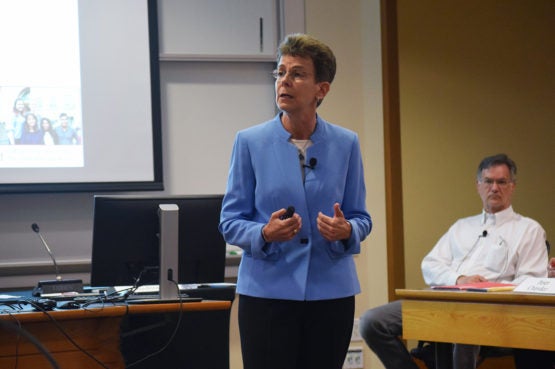Graduate education in the spotlight at Faculty Senate meeting
In her annual report to the Faculty Senate, Vice Provost Patricia Gumport emphasized the ‘‘holistic approach’’ that must govern Stanford’s thinking about support for graduate students.

Patricia Gumport, vice provost for graduate education and postdoctoral affairs, reporting to the Faculty Senate about the growth in graduate student enrollment and the financial challenges posed by graduate education. (Image credit: Kate Chesley)
Vice Provost for Graduate Education and Postdoctoral Affairs Patricia J. Gumport gave her annual report Thursday to the Faculty Senate, focusing on some of the progress made and challenges ahead in the areas of enrollment, diversity, affordability and academic advising for Stanford’s 9,400 graduate students and 2,300 postdoctoral scholars.
At the meeting, the senate also voted to approve a policy proposal that formalizes the departmental role of director of graduate studies (DGS). The DGS is a faculty member from a student’s department or program who serves as a liaison between the student and the program’s faculty, chair or director, the school and the university.
Report on graduate education
In her report, Gumport, who will step down at the end of the academic year, reflected on some of the progress Stanford has made in graduate education during her 12-year tenure. In particular, she noted the holistic approach that the university now takes toward graduate education, considering students’ daily experiences and well-being as integral to their education and academic progress.
“We have many graduate students and postdocs who are thriving and others who are struggling,” said Gumport, referring to recent national studies that show high levels of stress among graduate students over issues such as academic workload, faculty advising relationships, financial insecurity and uncertain job prospects. “What this calls for from us is more compassion,” she said.
Gumport reported that graduate enrollments have risen 21 percent over the last 15 years. That growth, which occurs through decentralized departmental admission processes, also brings increased costs to the university’s resources – unprecedented subsidies for housing, transportation, health insurance and need-based grants, she said.
Even with these subsidies, graduate students often face significant affordability challenges. Gumport noted that the Affordability Task Force Graduate Student Group has several studies under way, gathering and analyzing data on areas such as graduate funding patterns, housing, health insurance, strategic enrollment management and need-based grants for financial hardship. This is a formidable and complex set of challenges that must be tackled, since there currently is no sustainable growth model, Gumport said.
In her remarks, Gumport also expressed optimism for the university’s goal to advance diversity and inclusion. “We’re on track as a university. We know what we want to do in terms of diversity and inclusion. We’ve affirmed it’s essential to our mission. We know what our values are. We’re thinking about it in fundamentally different ways to affirm intersectional identities in an ever more inclusive community,” she said.
As one example of how graduate education has progressed in this area, Gumport pointed to the success of the Diversifying Academia, Recruiting Excellence (DARE) Doctoral Fellowship Program, administered by the Office of the Vice Provost for Graduate Education.
“With DARE we’ve not only increased diversity and inclusion in our graduate enrollment, but we’re preparing people to diversify the professoriate,” she said.
Faculty advising and mentoring have been areas that Gumport’s office has worked to strengthen by developing more resources and tools for effective practices among faculty and graduate students. She also referenced a policy change passed by the Faculty Senate last April that requires each academic department to articulate its advising expectations for both faculty and students.
As part of implementing that policy and in response to inconsistencies across programs regarding the role of director of graduate studies (DGS), the Committee on Graduate Studies unanimously endorsed a new policy. The policy requires that each graduate degree program to have a DGS, so that each Stanford graduate student has a faculty resource in addition to their faculty adviser and thesis committee members. As a faculty member from the student’s department or program, the DGS works to enhance the quality of students’ educational experiences, while also serving as a liaison between the student and the administration. The senate voted unanimously to approve the proposed policy.
Report from Provost Drell
Also at the senate meeting, Provost Persis Drell addressed concerns about funding for Stanford University Press. While the full 2019-20 budget won’t be presented to the Faculty Senate until next month, she noted that it will be a tight budget year, with an incremental payout of 2.1 percent on the endowment, which is below anticipated inflation.
For the past three years, the Press has received significant one-time incremental funds in an effort to help it reach a self-sustaining future, Drell said. Another request this year for additional incremental funds is not being approved, she said. Leaders from Stanford Libraries and the Press are now in discussions about how to develop a path going forward.
“In this very tight year, the [budget] group had to balance the merits of the ask for an additional chunk of one-time funds by the Press with other very high-priority asks,” she said, adding “these decisions are never easy.”
Several senate members voiced their opposition to this decision, citing the significant contributions of the Press to the university and its intellectual mission. A motion was raised to discuss the issue further at an upcoming senate meeting.
The full minutes of the April 25 meeting, including the discussion that followed the presentations, will be posted on the Faculty Senate website. The next senate meeting is scheduled for May 9.
